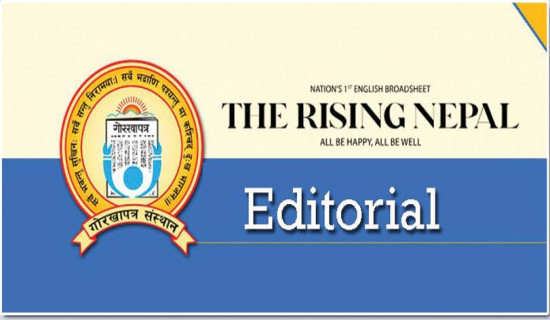- Wednesday, 26 June 2024
Agenda Of Climate Justice
Nepal hosted a two-day International Expert Dialogues on Mountains, People and Climate on Wednesday and Thursday and the climate jamboree urged prompt action to deal with the climate change impacts affecting the mountainous countries and mountain communities. The dialogue was a crucial forum to ensure that the mountain climate agenda garners the attention it deserves on the global platform. With more than 200 delegates from 23 countries in attendance, experts emphasised the adoption of cohesive policy direction for the upcoming UN climate talks in Bonn, Germany, scheduled for next month.
Glaciers in the Hindu Kush Himalayan mountain range have melted 65 per cent faster in the decade of 2010 compared to the previous decade which shows that global warming has started showing its hostile impacts. Glaciers are the major source of fresh water for most countries. The rapid melting of the ice store in the Himalayan region is likely to cause a dearth of fresh drinking water shortly. It will threaten the fragile ecosystem of the mountainous regions and communities dependent on natural resources their subsistence. The indigenous communities dependent on such resources are on the verge of being displaced due to the effect of climate change on the mountain ecosystem.
Nepal’s foreign exchange earning is largely based on tourism. The snowcapped mountains, rugged trekking trails, pristine glacial rivers, lakes and diversity in vegetation and wildlife and rich culture make up the attraction for tourists in Nepal. However, the snow cover in the mountains are melting at an alarming rate which is affecting biodiversity and causing the formation of more glacial lakes that have the danger of bursting. Resultant glacial lake outburst can cause widespread devastations to the infrastructure and human settlements lying in the downstream areas.
Mountains have played a pivotal role in the global climate system, maintaining the global temperature and serving as the water reservoir for billions of people living downstream, and in the coastal region. Millions of individuals whose lives and cultural identities are intertwined with these delicate ecosystems are on the brink of being displaced from their traditional homeland. Addressing the climate experts’ dialogue, Prime Minister Pushpa Kamal Dahal 'Prachanda' said, "Mountains are invaluable natural assets. These regions are home to 15 per cent of the global population and nearly half of its bio-diversity hotspots host a wide variety of flora and fauna and communities with different languages, cultures and traditions."
Researches have shown that the warming rate is higher in the mountains than in the adjoining plains. Projections alert us that the average temperature increase in the mountains will be over 1.8 degrees Celsius by 2050 at a time when discussions are focused to limit the global temperature to 1.5 degrees Celsius by the end of the century. The climate issues are not limited to the high mountains alone. Chure range, an equally important hill range in Nepal, is also facing the threat of rising temperatures. Traditional water sources here are drying up and large swathes of farmland in the Tarai plains are parched in absence of river flows.
Climate change impacts faced by the Chure Range is often overlooked when we are discussing the issues of mountains in the international forums. Rivers, streams and ponds in Tarai are going dry in the dry seasons. This trend is going have critical effects on the crucial ecosystems on which life is sustaining for ages.
















